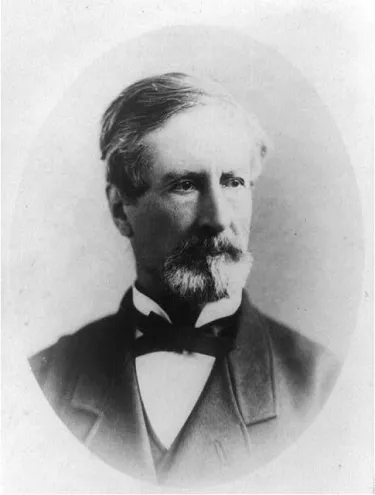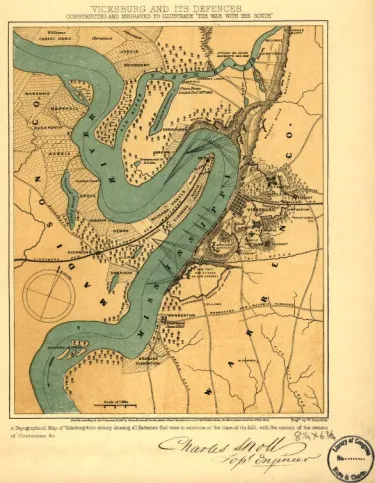The Key in Lincoln's Pocket

Elisa De Togni
Elisa De Togni, an Arkansas native, won the Civil War History Prize at the 2013 National History Day competition for her documentary about the 1863 Vicksburg Campaign. The Civil War Trust is proud to sponsor the prize and to support the hard work of the nation's history students.

THE DARK NIGHT ENSHROUDED the ten large vessels as they slowly and silently drifted along the horseshoe bend in the Mississippi River. Their engines were subdued, and all lights were smothered except for an occasional signal light from the rear of a ship. Several gun shots along the shore broke the silence - a warning of the vessels' approach. Soon the air was full of shot and shell hurled from the fortified Confederate city of Vicksburg high on the bluff overlooking the bend in the river.
As the seven ironclads and three transport ships neared Vicksburg, huge bonfires suddenly erupted along the river's shores, illuminating the sharp, bulky outlines of the Union fleet, transforming them into easy targets amid the fierce bombardment. Miraculously, only one ship was destroyed, and no deaths occurred as U.S. Rear Admiral David Porter's fleet "ran the gauntlet" past the Confederate guns at Vicksburg. Meanwhile, General Ulysses S. Grant's Army of the Tennessee marched south along the western bank of the Mississippi, and on April 30th, 1863, Porter's fleet facilitated the army's crossing of the river at Bruinsburg. Now on Mississippi soil, Grant embarked on his final operations against Vicksburg.
Both Presidents Abraham Lincoln and Jefferson Davis recognized the strategic and geographical significance of Vicksburg, one of the last two Confederate strongholds along the Mississippi River, the other being Port Hudson farther south. Lincoln famously remarked, "See what a lot of land these fellows hold, of which Vicksburg is the key! The war can never be brought to a close until that key is in our pocket. We can take all the northern ports of the Confederacy, and they can defy us from Vicksburg." Davis similarly pointed out the importance of Vicksburg as "the nailhead that holds the South's two halves together." The capture of Vicksburg and Port Hudson would allow the Union to control the entire Mississippi River and split the Confederacy in two, isolating Texas, Arkansas, and Louisiana from the rest of the Confederacy. The Southern Mississippi Railroad, which extended from Vicksburg and passed through Jackson, the capital of Mississippi, connected the western portion of the Confederacy to its eastern portion. It served as a main supply line for the transport of beef, corn, rice, and soldiers from the West. With the fall of Vicksburg, this vital supply line would inevitably be cut, a move that would be detrimental to the Confederacy's ability to wage war against the Union.
After crossing the river, Grant managed to win a chain of five battles east of the Mississippi River, resulting not only in the severing of the railroad but also the fall of Jackson. Confederate General John C. Pemberton, whose first priority was to protect Vicksburg from the Yankees, withdrew his battered army into the town to await reinforcements from General Joseph E. Johnston, the Confederate commander of the Department of the West. Soon Grant's army surrounded the Rebel defenses, and after two failed assaults on May 19th and 22nd, Grant decided to lay siege to Vicksburg. Although Pemberton's fortifications were practically impervious to Grant's attacks, the Union gunboats on the river continuously bombarded the town, and no supplies entered the city, resulting in the gradual starvation of both Southern soldiers and civilians trapped within Vicksburg.

As the days of the siege progressed, Johnston seemed no nearer to relieving Pemberton from the talons of Grant's army, which not only tightened its grip upon the city, but also designed methods to infiltrate the Confederate defenses. During the siege, Union soldiers and slaves taken from nearby households and plantations dug tunnels that reached below the Rebel trenches and packed them with explosive powder. On June 25th, one of these tunnels exploded, creating a large crater in the 3rd Louisiana Redan, a triangular part of the Confederate earthworks. After the explosion, Union soldiers poured into the crater, many of them unable to climb back out as deadly Confederate fire shattered their ranks. The Confederates continued to hold their defenses.
After 42 days of the siege, Pemberton received a note from his own soldiers: "Men don't want to starve, and don't intend to, but they call upon you for justice, if the commissary department can give it; if it can't, you must adopt some means to relieve us very soon. If you can't feed us, then you had better surrender us, horrible as the idea is, than suffer this noble army to disgrace themselves by desertion. I tell you plainly, men are not going to lie here and perish, [even] if they do love their country terribly. You had better heed a warning voice, though it is only the voice of a private soldier. "

Pemberton relinquished Vicksburg to Grant on the young nation's 87th Independence Day on July 4th, 1863. Pemberton surrendered his 30,000 man army, 60,000 rifles, and around 12% of all the Confederacy's cannons. With the fall of Port Hudson five days later, the Mississippi River was under Union control. The implications of the Vicksburg Campaign were immense, impacting the course of the Civil War and affecting how wars would be fought in the following century. The Union success at Vicksburg also influenced the politics of the war. When the Confederacy held Vicksburg, embittered Northern farmers and traders in the Ohio River Valley, who were unable to transport their goods down the Mississippi, begged the politicians in Washington and the generals in the field to open the river for trade. In July of 1863, their economic distress abated, and Lincoln, with the two victories of Vicksburg and Gettysburg in his pocket, secured for himself the 1864 presidential election. Ulysses S. Grant also received a promotion to the rank of Lieutenant General, commander of all Union forces in the field. Grant then placed his focus on the pursuit of Robert E. Lee's Army of Northern Virginia, eventually leading to a war of attrition in the East - a war the South could not win. Diplomatically, Vicksburg was a significant turning point during the Civil War. European nations, such as Britain and France, ended their considerations to recognize the South as an independent nation and ultimately decided against intervening in the war on the South's side.
One of the most important aspects of the Vicksburg Campaign is its long term impact upon military tactics and technology in future warfare. The Vicksburg Campaign marked a point in the Civil War when Napoleonic tactics were being replaced by modern methods of war, such as trench warfare, total warfare, joint army and navy operations, and the application of siege artillery in battle. As the War Between the States played out, the rest of the world was watching. Ironclads, submarines, hot air balloons, torpedoes, and mortar artillery guns were being experimented with on a scale previously unknown in warfare. The American Civil War changed the face of warfare and allowed the United States to become a world power in the next century. The Vicksburg Campaign, the turning point in the Civil War, is now seen as one of the most intense and innovative campaigns in world history.





